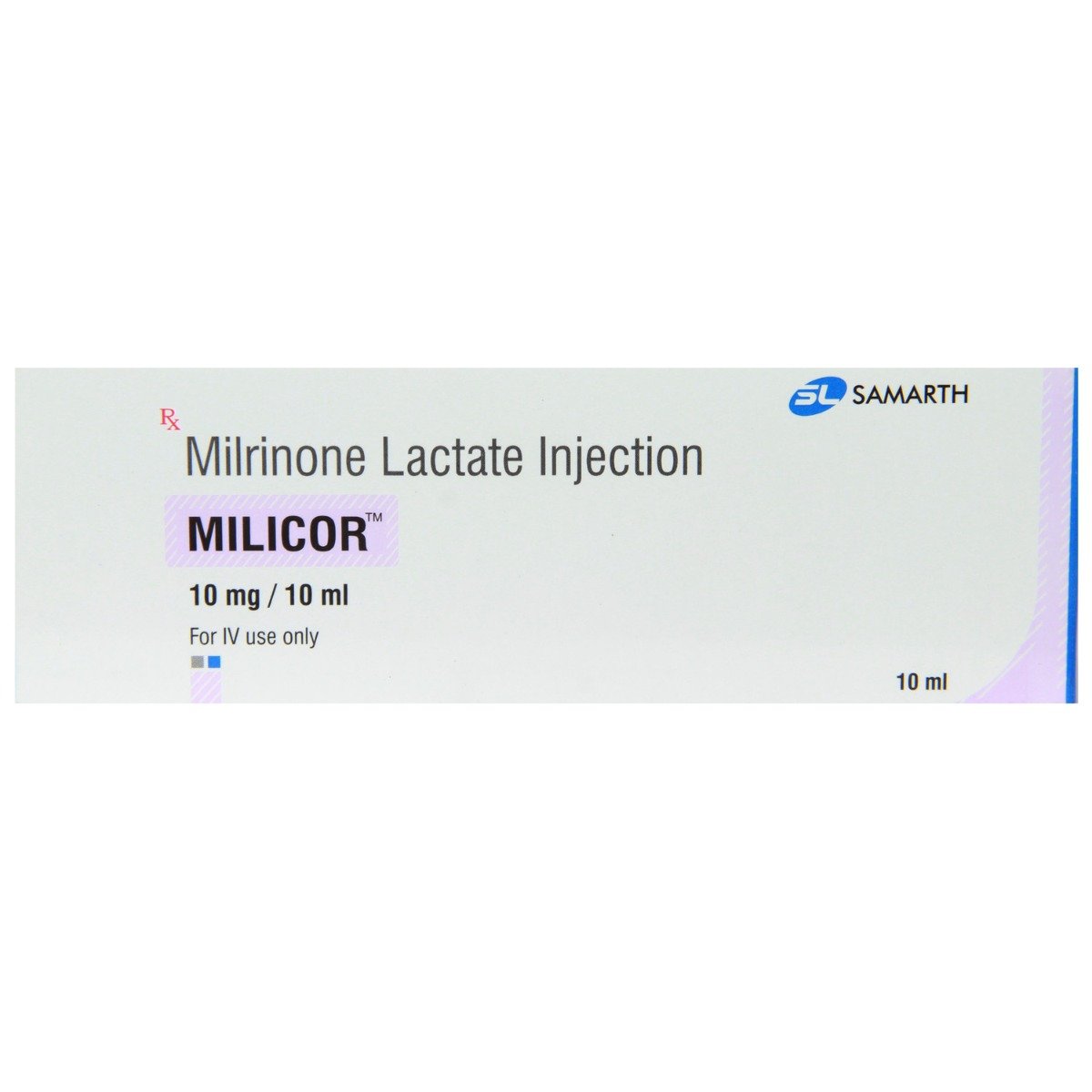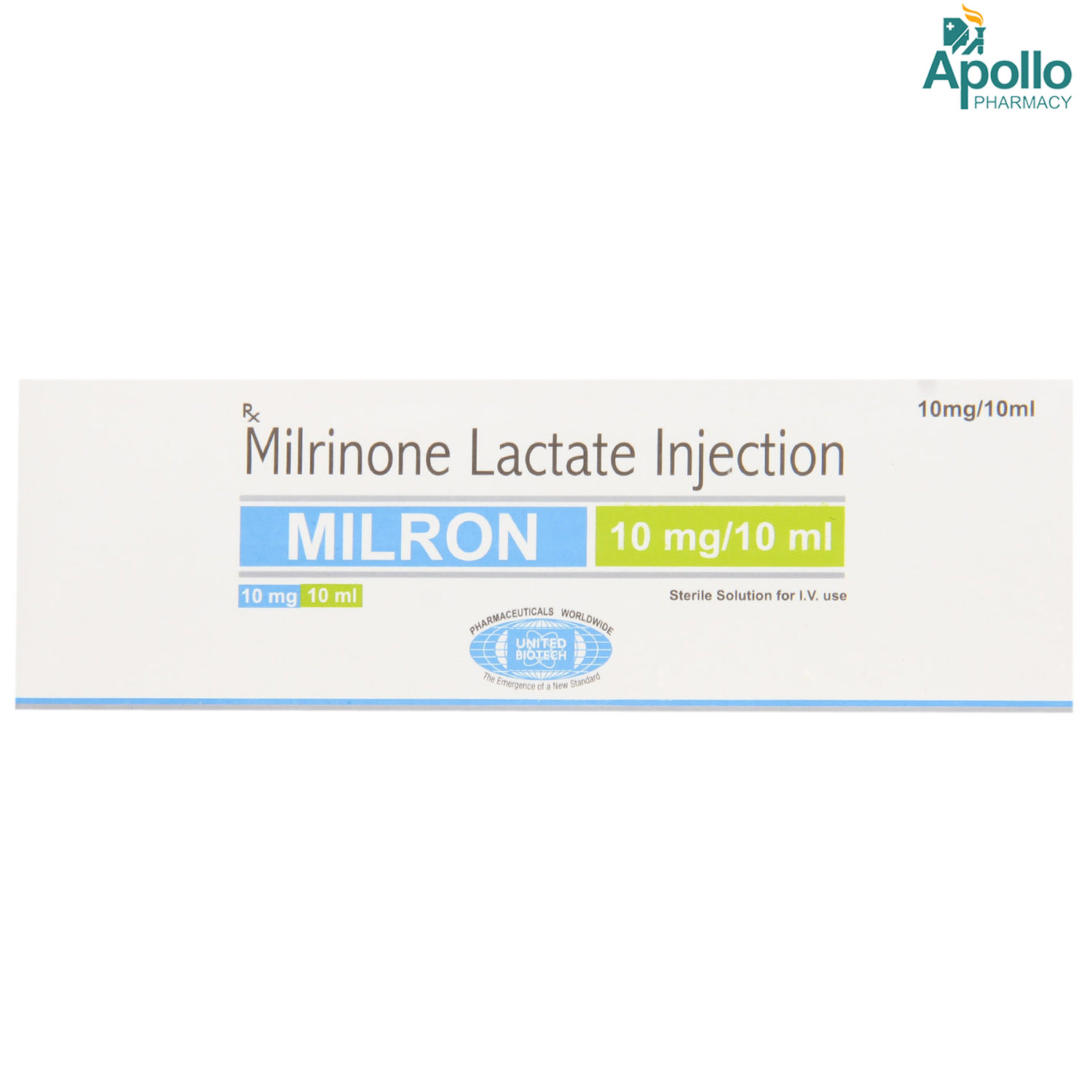Milrinone
About Milrinone
Milrinone belongs to the group of medications called vasodilators used to treat hypertension (high blood pressure) and short-term treatment of severe congestive heart failure. Hypertension is a chronic medical condition in which there is a high pressure of blood against the arteries walls (blood vessels). It is considered an essential risk factor for cardiovascular (heart) diseases. Heart failure is a chronic condition in which the heart cannot pump blood as effectively as it should.
Milrinone is a vasodilator that helps widen and relax the constricted blood vessels (due to high blood pressure) to promote blood flow, thereby reducing the high blood pressure.
Milrinone is given as an injection. It is administered by a healthcare professional. The common side-effects of Milrinone are headache, easy bruising, and tremors (uncontrollable rhythmic movement). These side effects usually do not require medical attention and gradually resolve during the treatment. If you experience any other symptoms you think may be due to Milrinone, please consult your doctor or pharmacist for further advice.
Do not take Milrinone if you have recently had a heart attack. Try not to miss or stop the Milrinone on your own. Stopping Milrinone may worsen your condition and increase your risk of cardiovascular death, heart attack, and stroke. Let your doctor know if you have a heart rhythm disorder, low levels of potassium, or kidney problems. Milrinone should be taken cautiously in pregnant or breastfeeding women. Your doctor will monitor heart rate, blood pressure, kidney function, and electrolytes during the treatment with Milrinone.
Uses of Milrinone
Medicinal Benefits
Milrinone is a vasodilator that treats hypertension (high blood pressure) and short-term treatment of life-threatening heart failure. Milrinone contains milrinone, a vasodilator in nature that works by relaxing the blood vessels and decreasing the heart's demand for oxygen. As a result, it reduces heart workload.
Directions for Use
Storage
Side Effects of Milrinone
- Headache
- Tremors
- Feeling shaky
- Easy bruising or bleeding
Drug Warnings
Pregnant or breastfeeding women are advised to consult a doctor before taking Milrinone. If you are known to be allergic to Milrinone or any other medicines, please tell your doctor. Avoid intake of alcohol with Milrinone. Inform your doctor if you experience pain/redness/swelling at the injection site, dizziness, fast/irregular heartbeat, chest pain after taking Milrinone. Before using Milrinone, tell your doctor if you have a medical history, especially of: heart valve disease, kidney disease, mineral imbalance (low level of potassium in the blood), irregular heartbeat. Do not take Milrinone if you are severely dehydrated.
Drug Interactions
Drug-Drug interactions: Disopyramide (antiarrhythmic medication), isocarboxazid (antidepressant), rasagiline (treat symptoms in early Parkinson's disease), selegiline ( treatment of Parkinson's disease), tizanidine (treat muscle spasticity), procarbazine (used for the treatment of brain cancers).
Drug-Food Interactions: Alcohol should not be taken along with Milrinone to avoid unpleasant side effects.
Drug-Disease Interactions: Arrhythmias (improper beating of the heart,), liver disease, hypotension (low blood pressure), thrombocytopenia (abnormally low levels of platelets), myocardial infarction (heart attack).
Drug-Drug Interactions Checker List:
Safety Advice

Alcohol
safe if prescribedNo interaction found or established. So, please consult your doctor before using Milrinone.

Pregnancy
cautionPlease consult your doctor if you are planning to become pregnant or if you are pregnant women before starting Milrinone.

Breast Feeding
cautionIt is not known if Milrinone passes into the breast milk and harms a baby during breastfeeding. Please consult the doctor before using Milrinone if you are a nursing mother.

Driving
safe if prescribedNo interaction found or established. So, please consult your doctor before using Milrinone.

Liver
cautionLet your doctor know if you have any history of liver diseases or hepatic impairment. Your doctor will weigh the benefits and potential risks before prescribing Milrinone.

Kidney
cautionLet your doctor know if you have any history of kidney diseases. Your doctor will weigh the benefits and potential risks before prescribing Milrinone. However, it is not recommended in patients with severe kidney diseases.

Children
cautionMilrinone should be used with caution in children.
Habit Forming
Diet & Lifestyle Advise
- Maintain a low-salt diet and minimize eating processed foods as they contain more sodium. Try to replace salt with spices or herbs to add flavour to the food.
- Regular exercise helps lower blood pressure and keeps blood vessels and the heart in good condition.
- Quit smoking as smoking increases blood pressure and heart rate.
- Eat a balanced and healthy diet with plenty of vegetables, fruits, and low-fat or fat-free products.
Special Advise
- Regular blood tests are advised while taking Milrinone to monitor the levels of potassium and kidney functioning.
- A low salt diet and regular exercise are recommended along with Milrinone for effective results.
- A regular electrocardiogram (ECG) should be done to see the effect of Milrinone on your heartbeat.
Patients Concern
Disease/Condition Glossary
Heart failure: Heart failure is a chronic condition in which the heart is unable to pump blood as effectively as it should. Heart failure may occur due to certain conditions like high blood pressure, swelling or damage of heart muscle, faulty heart valves, or narrow arteries in the heart. Symptoms of heart failure include shortness of breath, tiredness, a fast heartbeat, and swollen legs.
Hypertension (high blood pressure): It is a medical condition in which blood pressure is elevated persistently in the arteries. It is considered an essential risk factor for cardiovascular diseases and can be caused due to obesity, diabetes, smoking, high salt intake, stress, lack of physical activity, or ageing. Normal blood pressure lies between 90/60 mmHg and 120/80 mm of Hg. It is considered high blood pressure if the blood pressure is 140/90 mm of Hg or greater.
FAQs
Inform your doctor about your ongoing medications before starting Milrinone especially if you are taking digoxin (treat heart problems), diuretics (water tablets), or medicines used to treat high blood pressure such as amlodipine.
It may take several weeks for Milrinone to show its effect. You are recommended to continue taking Milrinone for as long as your doctor prescribes it and do not stop taking Milrinone suddenly as it may worsen your heart problems. However, if you experience any difficulty while on Milrinone, please speak with your doctor.
No, you can eat normally. However, a balanced and healthy diet is advised for effective results.
You are recommended to avoid taking Milrinone if you recently had a heart attack or if you have a known allergy to Milrinone.
Milrinone works by relaxing certain blood vessels, thereby increasing the amount of blood that is pumped from the heart. This effect will help to reduce the symptoms of heart failure (such as tiredness, shortness of breath).






